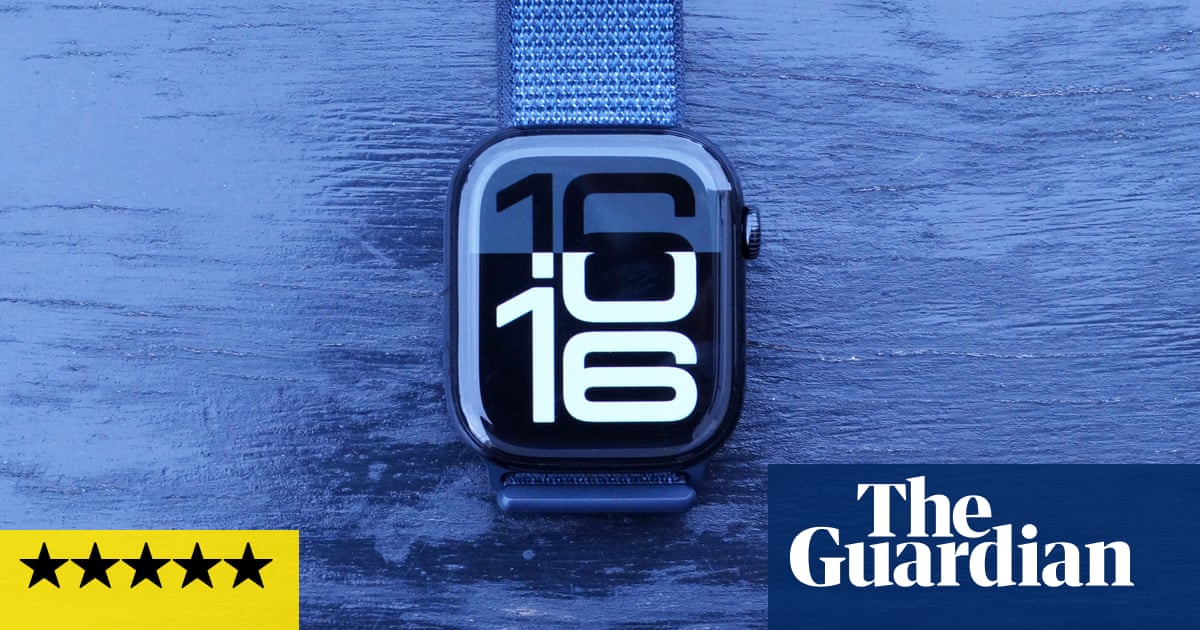A larger screen and thinner body mark the biggest change to the Apple Watch in years, but you might have to squint to see it.
That is because Apple has kept much the same design on the outside despite requiring significant changes on the inside to make the watch thinner and lighter. As a result, the Series 10 feels like another evolutionary, rather than revolutionary step for the Apple Watch’s 10th year.
At least the smartwatch has not increased in price. Costing from £399 (€449/$399/A$649) in aluminum or titanium, the Series 10 is available in 42mm and 46mm sizes replacing the previous 41mm and 45mm versions of its predecessor.
The extra 1mm case size across your wrist is not noticeable when wearing the watch, but the 1mm thickness and 2g weight that have been shaved off are. It may not sound like much, but squeaking in under 1cm thick with a closer fit to your body helps the watch more easily slide under shirt cuffs and reduces its movement during exercise.
The screens on both sizes are up to 9% larger than the past three generations, or a more significant 30% than 2020’s Series 6. The screen on the 46mm version is the largest fitted to an Apple Watch, edging out even the Ultra 2. On-screen buttons are larger and easier to tap, and it can show an extra line of text – or for those with aging eyes, larger text without losing functionality. The screen is also brighter, when viewed from an angle, which helps keep the time legible when glancing at your wrist while doing something else.
Battery life has grown slightly over previous models. The 46mm Series 10 lasted about 48 hours of continuous wearing, not including exercise. That still means charging every other day, but it should now just about last a weekend away without needing to activate low power mode immediately. It charges faster, hitting up to 80% in 30 minutes and full power in under an hour, which makes top-ups while in the shower more effective.
Specifications
-
Case size: 42 or 46mm
-
Case thickness: 9.7mm
-
Weight: 30/29.3g or 36.4/35.3g
-
Processor: S10
-
Storage: 64GB
-
Operating system: watchOS 11
-
Water resistance: 50 meters (5ATM)
-
Sensors: HR, ECG, spO2, air and water temp, depth, mic, speaker, NFC, GNSS, compass, altimeter
-
Connectivity: Bluetooth 5.3, wifi 4, NFC, UWB, optional 4G/eSIM
WatchOS 11
The Series 10 ships with watchOS 11, which runs on all models from 2020’s Series 6 and newer.
The software introduces a few new watch faces and apps, including new Translate and Tides apps, better smart stacks of widgets and other tweaks.
The Series 10 also has a new depth gauge and water temperature sensor used for measuring dives and other water activities down to 6 meter depths. The workout app can track your training load to tell you if you’re over- or under-doing strenuous exercise compared with your current fitness.
Sleep health gets a boost in the form of sleep apnea detection, which tracks and analyzes your night breathing disturbances once a month to alert you to any potential problems. The Vitals app does similar on a nightly basis for other health metrics such as average heart rate and sleep duration, alerting you when two or more of the metrics changes compared to your baseline.
Sustainability
Apple says the battery should last more than 1,000 full charge cycles, with at least 80% of its original capacity, and can be replaced for £95. Repairs cost between £309 and £409 depending on the model, but it was awarded only three out of 10 for repairability by the specialist iFixit.
It contains more than 30% recycled material including aluminium, cobalt, copper, glass, gold, plastic, rare earth elements, steel, tin, titanium and tungsten. Apple offers trade-in and free recycling for devices, and breaks down the watch’s environmental impact in its report.
Price
The Series 10 comes in two sizes (42 and 46mm), a choice of materials and the option of 4G that requires an e-sim and compatible phone plan add-on. It starts at £399 (€449/$399/A$649). 4G models cost an extra £100 (€120/$100/A$160).
For comparison, the Apple Watch Ultra 2 costs £799, the Apple Watch SE costs £219, the Google Pixel Watch 3 costs from £279 and the Samsung Galaxy Watch 7 costs from £289.
Verdict
It may not be the revolutionary redesign many were expecting for the tenth version of the Apple Watch, but the Series 10 is the most refined yet.
A slimmer profile, larger screen and reduced weight for the aluminum model make a bigger difference in day-to-day usability than the small numbers might suggest. And the difference is even greater for the lightweight titanium models that have replaced the heavyweight stainless steel of previous luxury versions. Those upgrading from five years or older models such as the Series 5 or 6 will see the biggest boost, it is just a shame it doesn’t really look any different.
It still gets about two days of battery life between charges, still excels in all the areas Apple now dominates, from payments to health-tracking. For those with an iPhone the Apple Watch Series 10 is the best smartwatch by some margin, even if it is not that exciting any more.
Pros: great always-on screen, slimmer design, excellent haptic vibrations, double-tap gesture, top health tracking, great activity tracking, 50-metre water resistance, solid battery life and faster charging, long software support, recycled materials, takes older watch straps .
Cons: expensive, only works with an iPhone, blood oxygen readings not available in the US, no third-party watch faces, looks the same as all recent models.












